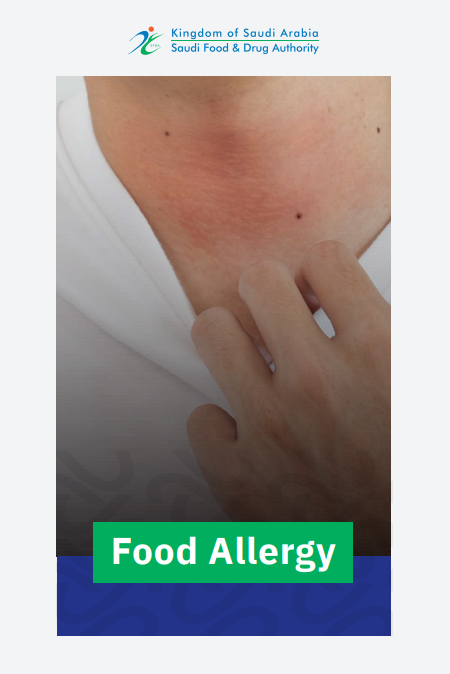According to international statistics, a person visits emergency every three minutes due to food allergy, and one of the national studies conducted by the National Nutrition Committee at the Saudi Food and Drug Authority (SFDA, in cooperation with Taibah University, indicates that 21% of the population of the Kingdom suffers from food allergy, and symptoms range from mild to severe, which may lead to death.
Food allergy is defined as a reaction of the immune system to a certain type of food, which is the component that cause food allergy, as the immune system believes that this component is a harmful object, even if an individual eats a small amount of it.
SFDA advises food allergy sufferers to inform the service provider about the type of food allergy they suffer from when ordering and eating outside the home, as the only treatment for food allergy is to avoid allergenic ingredients.
There is a group of allergenic ingredients that must be disclosed if meals contain it, namely: cereals, fish and its products, peanuts and their products, nuts and their products, milk and its products, sulfites, celery and its products, mustard and its products, eggs and its products, crustaceans and their products, mollusks and their products, Sesame seeds and their products, lupine and its products, and soybeans and their products.
Symptoms of food allergy differ from each person. The symptoms include headache, nausea, vomiting, sneezing or coughing, fainting, difficulty breathing, stomach pain, and skin rashes. There are also allergens, whether through inhalation, touching, or ingestion.
To promote public health and protect individuals with food allergies, SFDA launched “The Regulatory Guide for Creating Appropriate Menus for Food Allergic People" initiative. This initiative is concerned with providing food menus free of eggs, gluten and other allergenic ingredients.
This initiative, which targets owners of food facilities and online food ordering platforms, seeks to promote public health and improve the quality of life, facilitate individuals' access to food suitable for their health condition, provide appropriate food, and create a multi-restaurant environment suitable for individuals with food allergies. Moreover, reducing the incidence of food allergy symptoms and the consequences resulting from them when eating outside the home or ordering food through online platforms.
It is noteworthy that SFDA is currently implementing an awareness campaign entitled "What suits you may not suit me" to raise awareness of food allergy, the ingredients that cause it, its symptoms, allergens, and the most prominent advice on that.
One of the most important advices for parents in case the child suffers from a food allergy; tell the child about food ingredient he is allergic to, get him used to reading the ingredients label on food packages, or ask food providers about its ingredients before eating it.
It is also advisable to inform the person responsible of the child’s condition in schools and during events and trips, and it is preferable to put a bracelet or a plastic card for the child with the details of his injury, and in the event of travel make sure you know the name of the food allergens in the language of the country you are traveling to.


